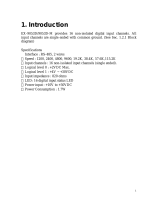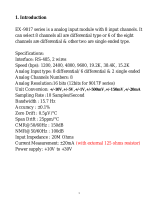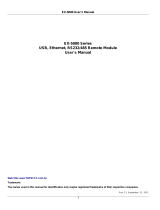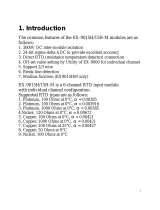ICP I-7017 - 8-channel Analog Input Data Acquisition Module, Communicable over RS-485 User manual
- Type
- User manual

I-7017/18/19, M-7017/18/19 User Manual, Rev: B2.6 7MH-020-B26
1
I-7017, I-7018, I-7019, M-7017,
M-7018 and M-7019 Series
User Manual
Warranty
All products manufactured by ICP DAS are under
warranty regarding defective materials for a period of one
year from the date of delivery to the original purchaser.
Warning
ICP DAS assumes no liability for damages resulting
from the use of this product. ICP DAS reserves the right
to change this manual at any time without notification.
The information furnished by ICP DAS is believed to be
accurate and reliable. However, no responsibility is
assumed by ICP DAS for its use, or for any infringements
of patents or other rights of third parties resulting from its
use.
Copyright
Copyright 1999 - 2013 ICP DAS. All rights reserved.
Trademark
The names used for identification only may be
registered trademarks of their respective companies.
Date: 2017/11/07

I-7017/18/19, M-7017/18/19 User Manual, Rev: B2.6 7MH-020-B26
2
Table of Contents
1. Introduction ............................................................................................... 6
1.1 More Information ............................................................................. 9
1.2 Terminal Assignment ..................................................................... 10
1.3 Specifications ................................................................................. 18
1.4 Block Diagrams .............................................................................. 24
1.4.1 Block diagram for the I-7017, I-7017F, and M-7017 .......... 24
1.4.2 Block diagram for the I-7017C, I-7017FC and M-7017C ... 24
1.4.3 Block diagram for the I-7017R and M-7017R ..................... 25
1.4.4 Block diagram for the I-7017R-A5 and M-7017R-A5 ....... 25
1.4.5 Block diagram for the I-7017Z and M-7017Z ..................... 26
1.4.6 Block diagram for the M-7017RMS .................................... 26
1.4.7 Block diagram for the I-7018, I-7018P and M-7018 .......... 27
1.4.8 Block diagram for the I-7018BL .......................................... 27
1.4.9 Block diagram for the I-7018R and M-7018R ..................... 28
1.4.10 Block diagram for the I-7018Z and M-7018Z ................... 28
1.4.11 Block diagram for the M-7018-16 ..................................... 29
1.4.12 Block diagram for the I-7019R and M-7019R ................... 29
1.4.13 Block diagram for the M-7019Z ........................................ 30
1.5 Dimensions ..................................................................................... 31
1.5.1 Modules without Frame Ground .......................................... 31
1.5.2 Modules with Frame Ground ............................................... 32
1.5.3 M-7018-16 ............................................................................ 33
1. 6 Wiring Diagrams ........................................................................... 34
1.6.1 Wiring diagram for the I-7017, I-7017F, I-7017R, M-7017
and M-7017R ......................................................................... 34
1.6.2 Wiring diagram for the I-7017C, I-7017FC, I-7017RC, M-
7017C and M-7017RC .......................................................... 35
1.6.3 Wiring diagram for the I-7017R-A5 and M-7017R-A5 ...... 35
1.6.4 Wiring diagram for the I-7017Z and M-7017Z .................... 35
1.6.5 Wiring diagram for the M-7017RMS ................................... 35
1.6.6 Wiring diagram for the I-7018, I-7018P, I-7018BL, I-7018R,
I-7018Z, M-7018, M-7018R and M-7018Z .......................... 36
1.6.7 Wiring diagram for the M-7018-16 ...................................... 37
1.6.8 Wiring diagram for the I-7019R, M-7019R and M-7019Z .. 37
1.7 Jumper Settings .............................................................................. 38
1.7.1 I-7017, I-7017F, I-7018, I-7018P and I-7018BL Jumper
Settings .................................................................................. 38
1.7.2 I-7019R and M-7019R Jumper Settings............................... 39
1.7.3 M-7019Z Jumper Settings .................................................... 41
1.7.4 I-7017Z and M-7017Z Jumper Settings ............................... 42

I-7017/18/19, M-7017/18/19 User Manual, Rev: B2.6 7MH-020-B26
3
1.8 Quick Start ...................................................................................... 43
1.9 Default Settings .............................................................................. 45
1.10 Calibration .................................................................................... 47
1.11 Configuration Tables .................................................................... 50
1.12 M-7000 Notes ............................................................................... 60
1.12.1 Protocol Switching ............................................................. 60
1.12.2 INIT Mode .......................................................................... 61
1.13 Mounting ...................................................................................... 62
1.13.1 DIN Rail Mounting ............................................................ 62
1.13.2 Piggyback Mounting .......................................................... 64
1.13.3 Wall Mounting.................................................................... 65
1.14 Technical Support......................................................................... 66
2. DCON Protocol ....................................................................................... 67
2.1 %AANNTTCCFF .......................................................................... 71
2.2 #** .................................................................................................. 75
2.3 #AA ................................................................................................ 77
2.4 #AAN, #AANN .............................................................................. 79
2.5 $AA0 .............................................................................................. 81
2.6 $AA1 .............................................................................................. 83
2.7 $AA0Ci........................................................................................... 85
2.8 $AA1Ci........................................................................................... 87
2.9 $AA2 .............................................................................................. 89
2.10 $AA3 ............................................................................................ 91
2.11 $AA4 ............................................................................................ 93
2.12 $AA5VV, $AA5VVVV ............................................................... 95
2.13 $AA6 ............................................................................................ 97
2.14 $AA7CiRrr ................................................................................... 99
2.15 $AA8Ci ...................................................................................... 102
2.16 $AA9 .......................................................................................... 104
2.17 $AA9SNNNN ............................................................................ 106
2.18 $AAA ......................................................................................... 108
2.19 $AAA ......................................................................................... 110
2.20 $AAAi ........................................................................................ 112
2.21 $AAB .......................................................................................... 114
2.22 $AAF .......................................................................................... 116
2.23 $AAM ......................................................................................... 117
2.24 $AAP .......................................................................................... 119
2.25 $AAPN ....................................................................................... 121
2.26 $AAS0 ........................................................................................ 123
2.27 $AAS1 ........................................................................................ 125
2.28 ~AAC ......................................................................................... 127
2.29 ~AACN ....................................................................................... 129
2.30 ~AAEV ....................................................................................... 131

I-7017/18/19, M-7017/18/19 User Manual, Rev: B2.6 7MH-020-B26
4
2.31 ~AAI ........................................................................................... 133
2.32 ~AAO(Name) ............................................................................. 135
2.33 ~AATnn ...................................................................................... 137
2.34 ~** .............................................................................................. 140
2.35 ~AA0 .......................................................................................... 141
2.36 ~AA1 .......................................................................................... 143
2.37 ~AA2 .......................................................................................... 145
2.38 ~AA3EVV .................................................................................. 147
2.39 ~AAEO ....................................................................................... 149
2.40 ~AAEON .................................................................................... 151
2.41 @AAS ........................................................................................ 153
2.42 @AASN ..................................................................................... 155
3. Modbus RTU Protocol .......................................................................... 157
3.1 02 (0x02) Read Input Status ......................................................... 158
3.2 04 (0x04) Read Input Channels .................................................... 159
3.3 70 (0x46) Read/Write Module Settings ....................................... 160
3.3.1 Sub-function 00 (0x00) Read module name ...................... 161
3.3.2 Sub-function 04 (0x04) Set module address ...................... 162
3.3.3 Sub-function 05 (0x05) Read communication settings ...... 163
3.3.4 Sub-function 06 (0x06) Set communication settings ......... 164
3.3.5 Sub-function 07 (0x07) Read type code ............................. 165
3.3.6 Sub-function 08 (0x08) Set type code ................................ 166
3.3.7 Sub-function 32 (0x20) Read firmware version ................. 167
3.3.8 Sub-function 37 (0x25) Read channel enabled/disabled status
............................................................................................. 168
3.3.9 Sub-function 38 (0x26) Set channel enable/disable ........... 169
3.3.10 Sub-function 41 (0x29) Read miscellaneous settings ...... 170
3.3.11 Sub-function 42 (0x2A) Write miscellaneous settings .... 171
3.3.12 Sub-function 43 (0x2B) Read CJC offset ........................ 172
3.3.13 Sub-function 44 (0x2C) Write CJC offset ....................... 173
3.3.14 Sub-function 45 (0x2D) Read CJC enabled/disabled status
............................................................................................. 174
3.3.15 Sub-function 46 (0x2E) Set CJC enable/disable .............. 175
3.3.16 Sub-function 47 (0x2F) Read CJC update setting............ 176
3.3.17 Sub-function 48 (0x30) Write CJC update setting ........... 177
3.4 Address Mappings ........................................................................ 178
3.4.1 M-7017 Series Address Mappings (Base 1) ....................... 178
3.4.2 M-7017RMS Address Mappings (Base 1) ......................... 180
3.4.3 M-7017Z Address Mappings (Base 1) ............................... 182
3.4.4 M-7018 Series Address Mappings (Base 1) ....................... 184
3.4.5 M-7018Z Address Mappings (Base 1) ............................... 186
3.4.6 M-7018-16 Address Mappings (Base 1) ............................ 188
3.4.7 M-7019R Address Mappings (Base 1) ............................... 190

I-7017/18/19, M-7017/18/19 User Manual, Rev: B2.6 7MH-020-B26
5
3.4.8 M-7019Z Address Mappings (Base 1) ............................... 193
3.5 Engineering Data Format Table ................................................... 195
4. Troubleshooting .................................................................................... 197
4.1 Communicating with the module ................................................. 198
4.2 Reading Data ................................................................................ 199
A. Appendix .............................................................................................. 200
A.1 INIT Mode ................................................................................... 200
A.2 Dual Watchdog Operation ........................................................... 202
A.3 Thermocouple .............................................................................. 203
A.4 Frame Ground .............................................................................. 204
A.5 Hexadecimal Data Conversion .................................................... 206

I-7017/18/19, M-7017/18/19 User Manual, Rev: B2.6 7MH-020-B26
6
1. Introduction
The I-7000 series is a family of network data acquisition
and control modules, providing analog-to-digital, digital-
to-analog, digital input/output, timer/counter and other
functions. The modules can be remotely controlled using
a set of commands, which we call the DCON protocol.
Communication between the module and the host is in
ASCII format via an RS-485 bi-directional serial bus
standard. Baud Rates are software programmable and
transmission speeds of up to 115.2K baud can be selected.
The functionality of the M-7000 series is the same as the
I-7000 series, with the exception that the M-7000 series
offers extended support for the Modbus RTU protocol.
Some I-7000 and all M-7000
modules feature a new design
for the frame ground and INIT
switch as shown in the figure
(rear view). The frame ground
provides enhanced static
protection (ESD) abilities and
ensures the module is more
reliable. The INIT switch
allows INIT mode to be
accessed more easily. Refer to
Sections A.1 and A.4 for more
details.
The common features of the I-7017, I-7018 and I-7019 are
as follows:
1. 3000V DC inter-module isolation

I-7017/18/19, M-7017/18/19 User Manual, Rev: B2.6 7MH-020-B26
7
2. 24-bit sigma-delta ADC to provide excellent accuracy
3. Software calibration
The I-7017 is an 8-channel voltage and current input
module. The I-7018 is an 8-channel voltage, current and
thermocouple input module. The I-7019 is an 8-channel
voltage, current, and thermocouple input module, with the
ability to connect various types of inputs to a single
module.
The I-7017 has the following variations:
I-7017F: added support for fast mode, 60
samples/second.
I-7017C: used for current input only, with no external
resistor required.
I-7017FC: used for current input only, with no external
resistor required. Added support for fast mode, 60
samples/second.
I-7017R: added high voltage overload protection,
240Vrms.
I-7017RC: used for current input only, with no external
resistor required. Added high voltage overload
protection, 240Vrms.
I-7017R-A5: used for high voltage input
I-7017Z: 10 channels, added high voltage overload
protection, 240Vrms
M-7017RMS: used for AC input
The I-7018 has the following variations:
M-7018-16: 16 channels, added thermocouple wire
opening detection
I-7018P: added support for two additional
thermocouple types, L and M

I-7017/18/19, M-7017/18/19 User Manual, Rev: B2.6 7MH-020-B26
8
I-7018BL: only support thermocouple types and with
thermocouple wire opening detection
I-7018R: added thermocouple wire opening detection
and high voltage overload protection, 240Vrms
I-7018Z: 10 channels, added thermocouple wire
opening detection and high voltage overload protection,
240Vrms
The I-7019 has the following variation:
I-7019R: added high voltage overload protection,
240Vrms
M-7019Z: 10 channels, added high voltage overload
protection, 240Vrms
The I-7017R, I-7017RC, I-7017Z, I-7018R, I-7018Z,
I-7019R and M-7019Z modules are designed for industrial
plant environments and have special input circuits to
provide 240Vrms continuous overload protection as
shown in the figure.

I-7017/18/19, M-7017/18/19 User Manual, Rev: B2.6 7MH-020-B26
9
1.1 More Information
Refer to chapter 1 of the “I-7000 Bus Converter User’s
Manual” as shown below or visit the ICP DAS website
http://www.icpdas.com for more information regarding the
I-7000 series.
1.1 The I-7000 Series Overview
1.2 Related Documentation for the I-7000 Series
1.3 Common Features of the I-7000 Series
1.4 The I-7000 Series System Network Configuration
1.5 I-7000 Dimensions

I-7017/18/19, M-7017/18/19 User Manual, Rev: B2.6 7MH-020-B26
10
1.2 Terminal Assignment

I-7017/18/19, M-7017/18/19 User Manual, Rev: B2.6 7MH-020-B26
11

I-7017/18/19, M-7017/18/19 User Manual, Rev: B2.6 7MH-020-B26
12

I-7017/18/19, M-7017/18/19 User Manual, Rev: B2.6 7MH-020-B26
13

I-7017/18/19, M-7017/18/19 User Manual, Rev: B2.6 7MH-020-B26
14

I-7017/18/19, M-7017/18/19 User Manual, Rev: B2.6 7MH-020-B26
15

I-7017/18/19, M-7017/18/19 User Manual, Rev: B2.6 7MH-020-B26
16
M-7018-16

I-7017/18/19, M-7017/18/19 User Manual, Rev: B2.6 7MH-020-B26
17

I-7017/18/19, M-7017/18/19 User Manual, Rev: B2.6 7MH-020-B26
18
1.3 Specifications
I-7017/M-7017
I-7017F/I-7017R
M-7017R
I-7017C
*3
/I-7017FC/I-7017RC
M-7017C
*3
/M-7017RC
Analog Input
Input Channels
8 differential
*1
8 differential
*1
8 differential
Input Type
mV, V, mA
*2
mV, V, mA
*2
mA
Sampling Rate
10 samples/sec
10 samples/sec (normal)
60 samples/sec (fast)
10 samples/sec (normal)
60 samples/sec (fast)
Bandwidth
15.7Hz
15.7Hz (normal)
78.7Hz (fast)
15.7Hz (normal)
78.7Hz (fast)
Accuracy
±0.1%
±0.1% (normal)
±0.5% (fast)
±0.1% (normal)
±0.5% (fast)
Zero Drift
20µV/°C
20µV/°C
20µV/°C
Span Drift
25ppm/°C
25ppm/°C
25ppm/°C
CMR@50/60Hz
86dB min
86dB min
86dB min
NMR@50/60Hz
100dB min
100dB min
100dB min
Input Impedance
20MΩ
I-7017R/M-7017R
1MΩ
I-7017F
20MΩ
125Ω
Voltage
overload
Protection
±120V
I-7017R/M-7017R
±240V
I-7017F
±120V
I-7017RC/M-7017RC
50mA at 110VDC
I-7017C/FC/M-7017C
50mA at 110VDC
Isolation
3000V DC
3000V DC
3000V DC
Modbus RTU
M-7017
M-7017R
M-7017C/M-7017RC
Power
Requirement
+10 to +30V DC
+10 to +30V DC
+10 to +30V DC
Consumption
1.3W
1.3W
1.3W
Temperature
Range
Operating
-25°C to +75°C
-25°C to +75°C
-25°C to +75°C
Storage
-30°C to +75°C
-30°C to +75°C
-30°C to +75°C
*1: For I-7017 and I-7017F, the number of input channels is 8 differential or 6
differential and 2 single-ended by jumper selection.
*2: requires optional external 125 ohm resistor.
*3: I-7017C and M-7017C does not support fast mode, 60 samples/sec sampling rate.
Note: A warm up period of 30 minutes is recommended in order to achieve the complete
performance results described in the specifications.

I-7017/18/19, M-7017/18/19 User Manual, Rev: B2.6 7MH-020-B26
19
I-7017R-A5
M-7017R-A5
I-7017Z
M-7017Z
Analog Input
Input Channels
8 differential
10 differential/20 single-
ended
Input Type
V
mV, V, mA (jumper
selectable)
Sampling Rate
10 samples/sec (normal)
50 samples/sec (fast)
10 samples/sec (normal)
60 samples/sec (fast)
Bandwidth
15.7Hz (normal)
78.7Hz (fast)
15.7Hz (normal)
78.7Hz (fast)
Accuracy
±0.1% (normal)
±0.25% (fast)
±0.1% (normal)
±0.5% (fast)
Zero Drift
20µV/°C
20µV/°C
Span Drift
25ppm/°C
25ppm/°C
CMR@50/60Hz
86dB min
86dB min
NMR@50/60Hz
100dB min
100dB min
Input Impedance
290KΩ
Differential: 2MΩ
Single-ended: 1MΩ
Current
Impedance
125Ω, 1/4W
Voltage overload
Protection
±200V
Differential: ±240V
Single-ended: ±150V
Isolation
3000V DC
3000V DC
Individual
Channel
Configurable
No
Yes
Modbus RTU
M-7017R-A5
M-7017Z
Power
Requirement
+10 to +30V DC
+10 to +30V DC
Consumption
1.7W
2.0W
Temperature
Range
Operating
-25°C to +75°C
-25°C to +75°C
Storage
-30°C to +75°C
-30°C to +75°C
Note: A warm up period of 30 minutes is recommended in order to
achieve the complete performance results described in the
specifications.

I-7017/18/19, M-7017/18/19 User Manual, Rev: B2.6 7MH-020-B26
20
M-7017RMS
Analog Input
Input Channels
8 differential
Input Type
Vrms
Sampling Rate
10 samples/sec
Bandwidth
15.7Hz
Accuracy
Sinusoid:
50/60Hz: ±0.15%
45Hz to 10kHz: ±0.45%
Non-sinusoid:
Crest factor 1 to 2: ±0.2%
Crest factor 2 to 3: ±0.3%
Zero Drift
20µV/°C
Span Drift
25ppm/°C
CMR@50/60Hz
86dB min
NMR@50/60Hz
100dB min
Input Impedance
2MΩ
Voltage overload
Protection
±35V
Isolation
3000V DC
Individual
Channel
Configurable
Yes
Modbus RTU
M-7017RMS
Power
Requirement
+10 to +30V DC
Consumption
0.9W
Temperature
Range
Operating
-25°C to +75°C
Storage
-30°C to +75°C
Note: A warm up period of 30 minutes is recommended in order to
achieve the complete performance results described in the
specifications.
Page is loading ...
Page is loading ...
Page is loading ...
Page is loading ...
Page is loading ...
Page is loading ...
Page is loading ...
Page is loading ...
Page is loading ...
Page is loading ...
Page is loading ...
Page is loading ...
Page is loading ...
Page is loading ...
Page is loading ...
Page is loading ...
Page is loading ...
Page is loading ...
Page is loading ...
Page is loading ...
Page is loading ...
Page is loading ...
Page is loading ...
Page is loading ...
Page is loading ...
Page is loading ...
Page is loading ...
Page is loading ...
Page is loading ...
Page is loading ...
Page is loading ...
Page is loading ...
Page is loading ...
Page is loading ...
Page is loading ...
Page is loading ...
Page is loading ...
Page is loading ...
Page is loading ...
Page is loading ...
Page is loading ...
Page is loading ...
Page is loading ...
Page is loading ...
Page is loading ...
Page is loading ...
Page is loading ...
Page is loading ...
Page is loading ...
Page is loading ...
Page is loading ...
Page is loading ...
Page is loading ...
Page is loading ...
Page is loading ...
Page is loading ...
Page is loading ...
Page is loading ...
Page is loading ...
Page is loading ...
Page is loading ...
Page is loading ...
Page is loading ...
Page is loading ...
Page is loading ...
Page is loading ...
Page is loading ...
Page is loading ...
Page is loading ...
Page is loading ...
Page is loading ...
Page is loading ...
Page is loading ...
Page is loading ...
Page is loading ...
Page is loading ...
Page is loading ...
Page is loading ...
Page is loading ...
Page is loading ...
Page is loading ...
Page is loading ...
Page is loading ...
Page is loading ...
Page is loading ...
Page is loading ...
Page is loading ...
Page is loading ...
Page is loading ...
Page is loading ...
Page is loading ...
Page is loading ...
Page is loading ...
Page is loading ...
Page is loading ...
Page is loading ...
Page is loading ...
Page is loading ...
Page is loading ...
Page is loading ...
Page is loading ...
Page is loading ...
Page is loading ...
Page is loading ...
Page is loading ...
Page is loading ...
Page is loading ...
Page is loading ...
Page is loading ...
Page is loading ...
Page is loading ...
Page is loading ...
Page is loading ...
Page is loading ...
Page is loading ...
Page is loading ...
Page is loading ...
Page is loading ...
Page is loading ...
Page is loading ...
Page is loading ...
Page is loading ...
Page is loading ...
Page is loading ...
Page is loading ...
Page is loading ...
Page is loading ...
Page is loading ...
Page is loading ...
Page is loading ...
Page is loading ...
Page is loading ...
Page is loading ...
Page is loading ...
Page is loading ...
Page is loading ...
Page is loading ...
Page is loading ...
Page is loading ...
Page is loading ...
Page is loading ...
Page is loading ...
Page is loading ...
Page is loading ...
Page is loading ...
Page is loading ...
Page is loading ...
Page is loading ...
Page is loading ...
Page is loading ...
Page is loading ...
Page is loading ...
Page is loading ...
Page is loading ...
Page is loading ...
Page is loading ...
Page is loading ...
Page is loading ...
Page is loading ...
Page is loading ...
Page is loading ...
Page is loading ...
Page is loading ...
Page is loading ...
Page is loading ...
Page is loading ...
Page is loading ...
Page is loading ...
Page is loading ...
Page is loading ...
Page is loading ...
Page is loading ...
Page is loading ...
Page is loading ...
Page is loading ...
Page is loading ...
Page is loading ...
Page is loading ...
Page is loading ...
Page is loading ...
Page is loading ...
Page is loading ...
Page is loading ...
Page is loading ...
Page is loading ...
Page is loading ...
-
 1
1
-
 2
2
-
 3
3
-
 4
4
-
 5
5
-
 6
6
-
 7
7
-
 8
8
-
 9
9
-
 10
10
-
 11
11
-
 12
12
-
 13
13
-
 14
14
-
 15
15
-
 16
16
-
 17
17
-
 18
18
-
 19
19
-
 20
20
-
 21
21
-
 22
22
-
 23
23
-
 24
24
-
 25
25
-
 26
26
-
 27
27
-
 28
28
-
 29
29
-
 30
30
-
 31
31
-
 32
32
-
 33
33
-
 34
34
-
 35
35
-
 36
36
-
 37
37
-
 38
38
-
 39
39
-
 40
40
-
 41
41
-
 42
42
-
 43
43
-
 44
44
-
 45
45
-
 46
46
-
 47
47
-
 48
48
-
 49
49
-
 50
50
-
 51
51
-
 52
52
-
 53
53
-
 54
54
-
 55
55
-
 56
56
-
 57
57
-
 58
58
-
 59
59
-
 60
60
-
 61
61
-
 62
62
-
 63
63
-
 64
64
-
 65
65
-
 66
66
-
 67
67
-
 68
68
-
 69
69
-
 70
70
-
 71
71
-
 72
72
-
 73
73
-
 74
74
-
 75
75
-
 76
76
-
 77
77
-
 78
78
-
 79
79
-
 80
80
-
 81
81
-
 82
82
-
 83
83
-
 84
84
-
 85
85
-
 86
86
-
 87
87
-
 88
88
-
 89
89
-
 90
90
-
 91
91
-
 92
92
-
 93
93
-
 94
94
-
 95
95
-
 96
96
-
 97
97
-
 98
98
-
 99
99
-
 100
100
-
 101
101
-
 102
102
-
 103
103
-
 104
104
-
 105
105
-
 106
106
-
 107
107
-
 108
108
-
 109
109
-
 110
110
-
 111
111
-
 112
112
-
 113
113
-
 114
114
-
 115
115
-
 116
116
-
 117
117
-
 118
118
-
 119
119
-
 120
120
-
 121
121
-
 122
122
-
 123
123
-
 124
124
-
 125
125
-
 126
126
-
 127
127
-
 128
128
-
 129
129
-
 130
130
-
 131
131
-
 132
132
-
 133
133
-
 134
134
-
 135
135
-
 136
136
-
 137
137
-
 138
138
-
 139
139
-
 140
140
-
 141
141
-
 142
142
-
 143
143
-
 144
144
-
 145
145
-
 146
146
-
 147
147
-
 148
148
-
 149
149
-
 150
150
-
 151
151
-
 152
152
-
 153
153
-
 154
154
-
 155
155
-
 156
156
-
 157
157
-
 158
158
-
 159
159
-
 160
160
-
 161
161
-
 162
162
-
 163
163
-
 164
164
-
 165
165
-
 166
166
-
 167
167
-
 168
168
-
 169
169
-
 170
170
-
 171
171
-
 172
172
-
 173
173
-
 174
174
-
 175
175
-
 176
176
-
 177
177
-
 178
178
-
 179
179
-
 180
180
-
 181
181
-
 182
182
-
 183
183
-
 184
184
-
 185
185
-
 186
186
-
 187
187
-
 188
188
-
 189
189
-
 190
190
-
 191
191
-
 192
192
-
 193
193
-
 194
194
-
 195
195
-
 196
196
-
 197
197
-
 198
198
-
 199
199
-
 200
200
-
 201
201
-
 202
202
-
 203
203
-
 204
204
-
 205
205
-
 206
206
ICP I-7017 - 8-channel Analog Input Data Acquisition Module, Communicable over RS-485 User manual
- Type
- User manual
Ask a question and I''ll find the answer in the document
Finding information in a document is now easier with AI
Related papers
-
ICP DAS USA M-7019R - 8-channel Thermocouple, Current and Voltage Analog Input Module, Communicates over RS-485 and Modbus RTU. User manual
-
ICP DAS USA M-7018R User manual
-
ICP DAS USA M-7017R User manual
-
ICP DAS USA M-7019Z-S2 User manual
-
ICP DAS USA M-7017RMS User manual
-
ICP DAS USA M-7002 User manual
-
ICP M-6018-16 User manual
-
ICP M-2017 User manual
-
ICP DAS USA PET-7019Z-S User manual
-
ICP DAS USA Calibration Certificate for ZT-2018 User manual
Other documents
-
ICP DAS I-7018R User guide
-
 ExpertDAQ EX9053D User manual
ExpertDAQ EX9053D User manual
-
ICP DAS USA I-7017(F)C User guide
-
 ExpertDAQ EX9017F User manual
ExpertDAQ EX9017F User manual
-
ExpertDAQ EX9018BL User manual
-
Fluke 714B Thermocouple Calibrator User manual
-
Logicbus PET-7017-10 User guide
-
 Ditel KOS1620 Technical Manual
Ditel KOS1620 Technical Manual
-
 ExpertDAQ EX5029 User manual
ExpertDAQ EX5029 User manual
-
 ExpertDAQ EX9015 User manual
ExpertDAQ EX9015 User manual


















































































































































































































